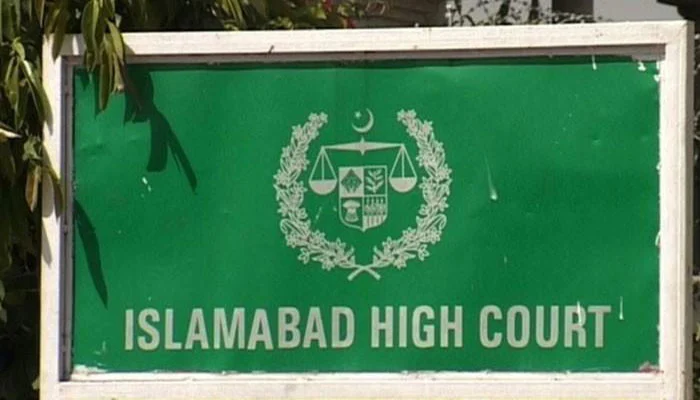IHC decides to form a larger bench to hear PTI’s plea against ECP’s judgment in the prohibited funding case
ISLAMABAD ( Web News )
The Islamabad High Court (IHC) on Tuesday decided to form a larger bench to hear the Pakistan Tehreek-e-Insaf’s plea against the Election Commission of Pakistan’s (ECP) judgment in the prohibited funding case.
IHC Acting Chief Justice Aamer Farooq presided over Tuesday’s hearing during which PTI’s lawyer Anwar Mansoor Khan was also present.
Anwar Mansoor Khan said that the party had challenged the electoral watchdog’s “fact- finding report” in the case. He went on to argue that money was transferred from the main account to the provinces, saying that it was not necessary to disclose the details. Anwar Mansoor Khan urged the court to ensure that no action is taken as far as the notice to the party is concerned. “A larger bench will take up the matter,” Justice Farooq remarked. Subsequently, the court fixed the matter before a larger bench and adjourned the hearing tomorrow (Thursday).
Earlier this month, the three-member of ECP, in a unanimous verdict, had ruled that the party did receive millions of dollars of funds from 351 foreign companies and 34 foreign nationals, including a US-Indian businesswoman, and ordered the issuance of a notice to the PTI, seeking an explanation as to why the prohibited funds it received should not be forfeited.
A three-member ECP bench headed by Chief Election Commissioner (cEC) Dr. Sikander Sultan Raja announced the verdict in a case filed by PTI founding member Akbar Sher Babar which had been pending since November 14, 2014.
The ECP also said the party had only owned eight accounts before the commission and declared 13 accounts to be unknown. The commission noted that the party also failed to mention three accounts which were also being operated by the party’s senior leadership.
The verdict also stated that the PTI chairman submitted Form-I for five years (between 2008-2013) which was found to be “grossly inaccurate on the basis of the financial statements obtained by this commission from SBP and other material available on record”.
The PTI said the verdict vindicated its stance that it never received foreign funding, but could be a case of prohibited funding, while the government considered the decision a “charge sheet” against “crimes” of the party and its chief Imran Khan.
Last week, the party had moved the IHC against the ECP’s judgment in the prohibited funding case against the party.
The main petition filed by the party stated that the Supreme Court had examined the matter and referred it back to the ECP for scrutiny of the accounts of all political parties, including the PTI. “Sadly, only PTI was targeted.”
Filed by PTI Additional General Secretary Omar Ayub Khan, the case against PTI pertains to an allegation of receiving “funds from prohibited source”
The petition said, “the party explained and reconciled each and every account through a financial expert, orally as also by submitting a written financial summary, reconciling each and every transaction and, explaining all amounts received with its reconciliation with the audited accounts. However, in complete disregard to all the submissions and without giving any reasoning for such disregard the respondent [ECP] passed the impugned fact finding report”.
The petition pointed out the ECP is not complete “in the absence of the total number of members as defined in the Constitution and deficient representation from all provinces? If so, does it not disenfranchise the provincial representation on the ECP as envisaged by the Constitution of Pakistan permitting manipulation and outside political interference in the work of the ECP?”
Ayub said ECP had not considered, not even rebutted, the information provided by PTI and “acted with sheer mala fide, without application of mind and has based its findings on fabricated facts, which were aimed to harm and tarnish the political image of the petitioner”.
The petition requested the court to suspend the ECP’s verdict and the show cause notice issued to PTI as well as set aside the ECP’s report on the foreign funding.

